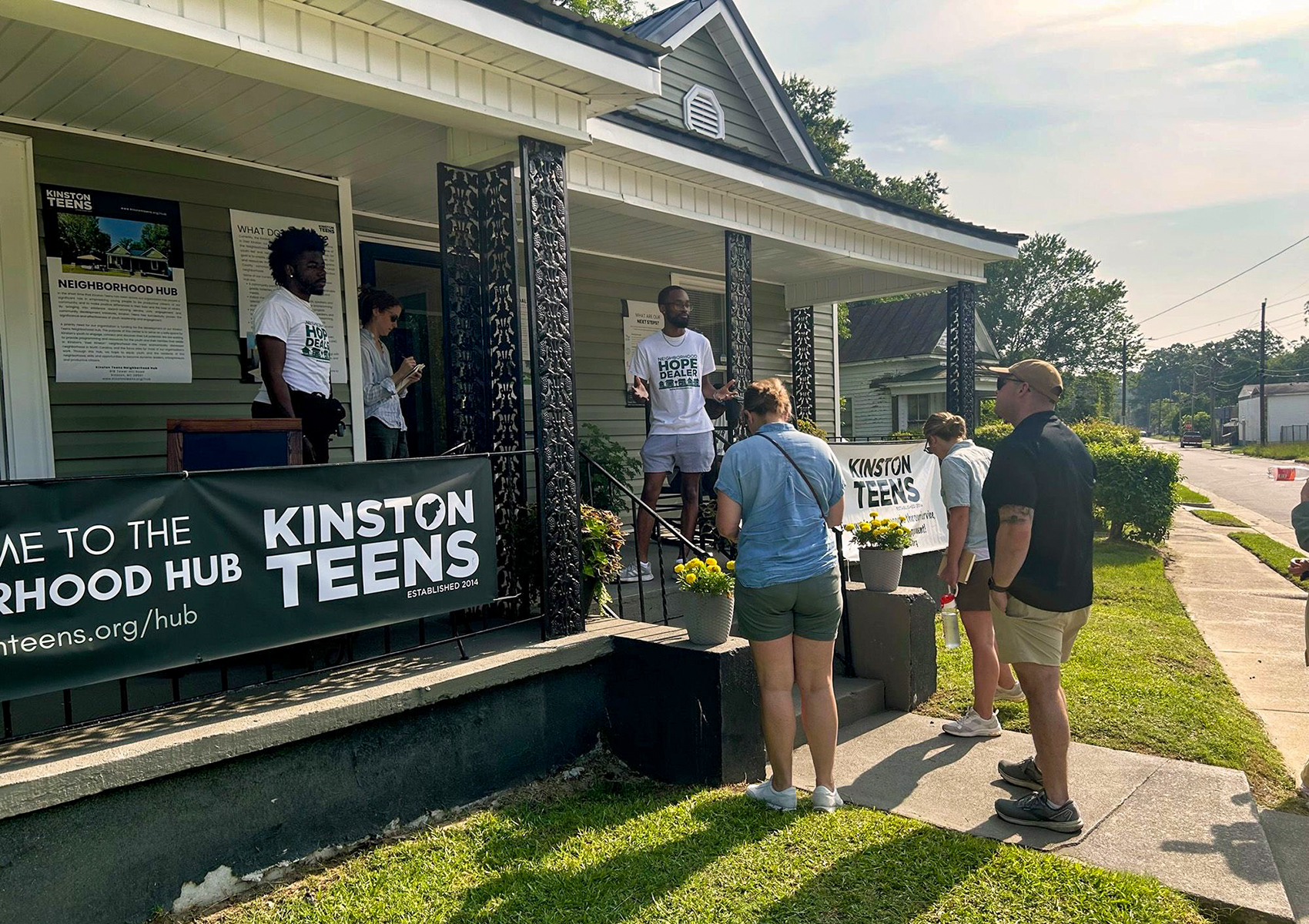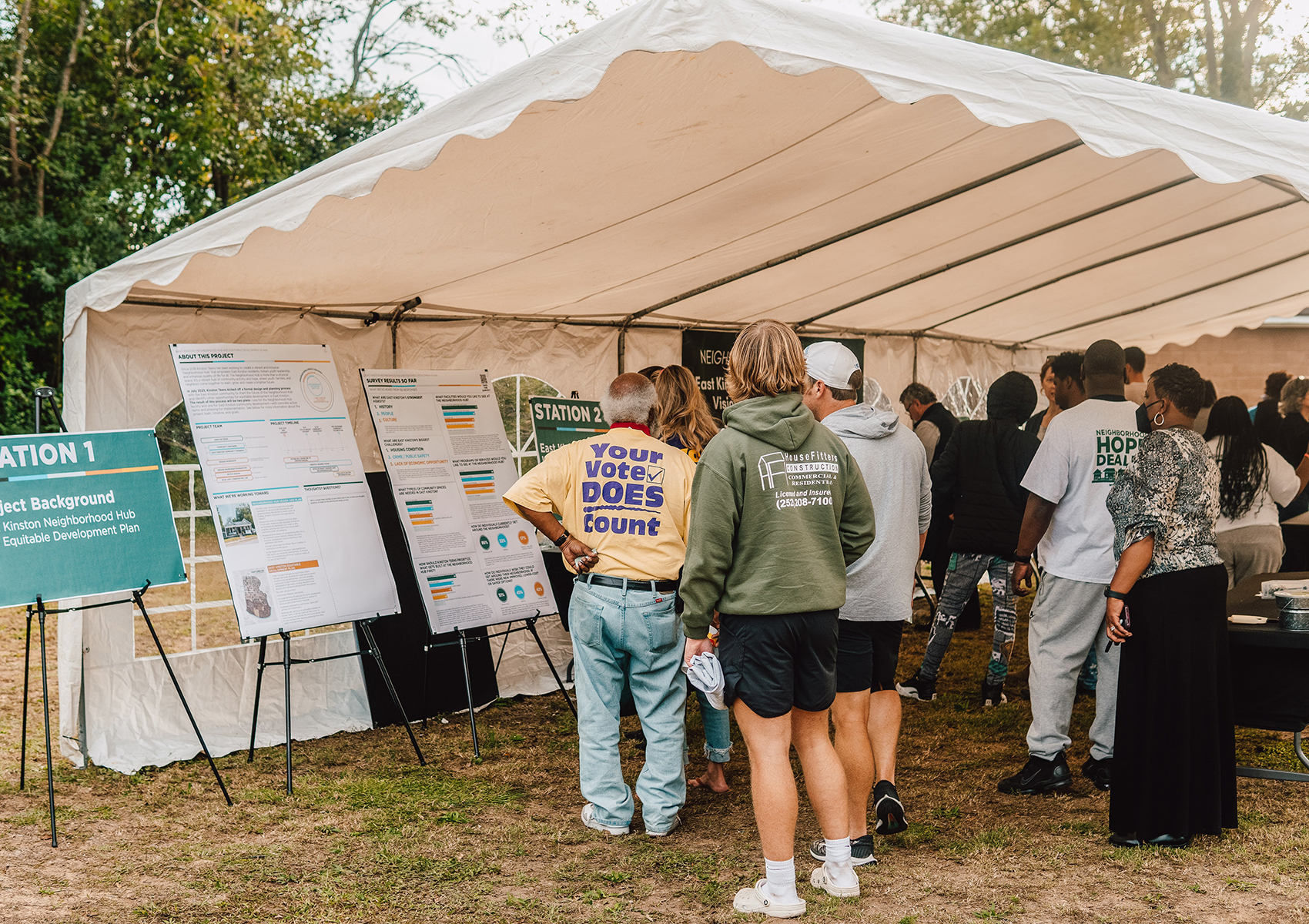Q&A


Meet Chris Suggs, founder of Kinston Teens Inc. and City Councilmember of Kinston, North Carolina. We’ve had the honor of collaborating with Chris as a client on the Emma Web Park Master plan in Kinston and on the East Kinston Neighborhood Hub and Equitable Development plan. Learn more about the work we are doing together to shape the Kinston community.
Tell us your story. What was your journey to get to where you are today?
I founded Kinston Teens in 2014 at the age of 14 after witnessing violence and systemic disinvestment in my community, particularly in my neighborhood of East Kinston. I wanted to create something that would empower young people like myself to be part of the solution—to build up our neighborhoods, advocate for justice, and reimagine what’s possible for our city. Over the past decade, we’ve grown from a grassroots youth group into a nonprofit that leads programs in civic engagement, community revitalization, and climate resilience. I now serve as both Executive Director of Kinston Teens and a member of the Kinston City Council, where I focus on housing, economic opportunity, and environmental sustainability. When I won my election in November 2021, I became the youngest elected official in North Carolina.
Tell us about the work you did in collaboration with Design Workshop for the Emma Webb Park Master Plan? What challenge were you trying to address?
Our work in collaboration with Design Workshop and the Design Workshop Foundation has been rooted in the urgent need for equitable, community-driven development in Kinston. For decades, our community—like many others across the South—has faced the consequences of systemic racism, flooding, disinvestment, and displacement. When the City of Kinston was exploring ways to repurpose or revitalize Emma Webb Park, a historic park in the center of town that had fallen into disrepair, the City asked us to help identify a planning firm and lead community engagement for this effort. We helped select Design Workshop to lead the Master Plan process.
We saw our organization’s role in this partnership to empower youth and neighborhood residents to be true stakeholders in this planning process. Our project team worked together to gather and translate community input into the Emma Webb Park Master Plan. This plan includes new recreation amenities, a stream restoration effort, flood mitigation components, and green infrastructure. It is our goal that the implementation of this plan will make Emma Webb a local and regional model for greenspace restoration and community-centered flood mitigation.
The Emma Webb Park Master Plan went on to win a Merit Award in Planning and Analysis from the American Society of Landscape Architects, a testament to our creative community engagement strategies and the thoughtful approach by the Design Workshop team.
Tell us about your work with DW Foundation on the East Kinston Equitable Development Plan.
At the same time we were collaborating with Design Workshop on the Emma Webb Park Master Plan, we were facing the realization that Kinston Teens was outgrowing our space at the East Kinston Neighborhood Hub, the community center and resilience hub we opened in 2020. In early 2023, we reached out to Design Workshop to help imagine and plan a new and larger facility. With the support of the DW Foundation’s Community Capacity Building Initiative, we were able to develop the East Kinston Neighborhood Hub and Equitable Development Plan.
What impact will the East Kinston Equitable Development Plan and Emma Webb Park Master Plan have on the community?
Both plans lay the foundation for transformative, resident-led investment. The East Kinston Neighborhood Hub & Equitable Development Plan not only guides the design of our new Neighborhood Hub facility but also serves as a roadmap for sustainable and inclusive growth across the neighborhood from housing and infrastructure to programming and green space. The Emma Webb Park Master Plan repositions the park as a center for health, culture, flood mitigation, and recreation. Together, these efforts are restoring a sense of ownership, pride, and possibility in our community. They show that development can be equitable, rooted in culture, and guided by the people who live there.

What do you enjoy most about working with Design Workshop/DW Foundation?
Design Workshop and DW Foundation brought more than just technical expertise—they brought respect, humility, and a genuine commitment to the community. They didn’t parachute in with a predetermined plan. Instead, they took the time to listen, build relationships, and co-create with residents, youth, and neighborhood stakeholders. I appreciated their ability to translate community vision into compelling, fundable, and actionable designs. I never felt that we were just “clients,” but it felt like a true partnership that centered our values while elevating our work to new levels of impact and visibility.
What’s next for Kinston Teens as a result of the work you are doing with Design Workshop/DW Foundation?
We’re now in the implementation phase of the East Kinston Neighborhood Hub, moving from vision to reality. With these plans as our blueprint, we’re fundraising and applying for grants for construction, expanding our program offerings, and activating new community partnerships. The Equitable Development Plan has also positioned us as a leader in rural climate justice and community development. Thanks to the support of the DW Foundation through its Community Capacity Building Initiative, our organization is more strategic, stable, and ambitious in its mission and has started to grow our funding apparatus and staff. The next chapter for Kinston Teens is about scaling impact while staying deeply rooted in the community that raised us.